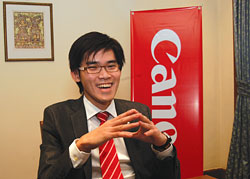Country Manager Jordan Ng of Canon Singapore was in Kathmandu last week. He spoke to Nepali Times about the boom in the South Asian market and his company's marketing campaign in Nepal.
|
|
Jordan Ng: Canon is going to market itself and achieve the share of number one position. We are not yet number one in all the categories. We look forward to at least 40 percent growth in 2008. We will carry out a lot of advertising, end user promotions and campaigns. We will provide free trainings for consumers, we will have an interactive Q&A section on our website for local customers.
What are the challenges?
For imaging products, we have a lot of inflow from neighbouring countries. It is difficult to stop inflow because Nepalis go to neighbouring countries and bring back Canon products. We have to provide support services and warranty. We cannot reject them because Canon is a global brand. Therefore, our biggest challenge will be to educate local customers to buy locally. The local market hasn't really touched Canon products yet. Therefore the initiative to create a Canon showroom, which will be a place where customers can touch, feel and learn about the products before they buy.
Is the analog technology dead? What is the industry assessment?
In terms of digital vs analog, the former has phased out. In global trends we are already moving on to high definition. There are high definition panels for video and tv. High definition video and image quality is what Canon is good at. Soon everything will be digital and analog will no longer be in market anymore.
In the next five years, how do you see the convergence of photography with mobile telephony?
Mobile phones today have 3 or 3.5 megapixels and some can also do video. However, in terms of quality they are not up to the mark. If you were to download whatever you have captured in your camera phone onto the computer and play it out big, you will see a lot of pixelation. Phones are used to make calls, while imaging and video products have to have quality. Since the final output is going to be projected and high definition, why not use a camera, which will give you high quality images and videos? Canon has no plans of making camera phones. We are looking at quality. If you want a high-resolution image you have to use a semore sensor for cameras which current mobile phones can't sustain. We don't think you can turn a phone into an imaging device.
How do you see the growth of professional photography market in South Asia?
Our market share in South Asia has been growing every year. We are already exceeding our 30 percent market growth in the region. This means Canon has become the preferred choice for dealers and consumers. Our strength is that we are good at giving not just technical but also customer service.
What are some of your future plans in Nepal?
We want to target the young people, who go abroad to work and bring back money. We want to also tap into the corporate and business class who travel frequently. They have the opportunity to buy Canon products when they travel, but we want educate them that it is better to buy our products locally. We may negotiate tourism packages with some travel agencies. In terms of printing products, Canon will do more to build its image here in Nepal. We already have strong competition in printing products. Corporate offices, hotels and banks are used to using a specific brand and it may not be easy to penetrate, so we will have to do some brand convergence exercises.



